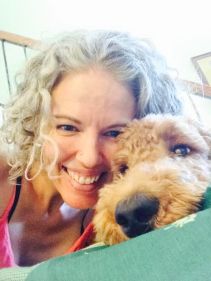by Stephanie Abraham

Since New Year’s Eve, my social media stream has been brimming with friends’ resolutions to declutter their lives, purging negative relationships, thoughts and behaviors. Inspired by their resolve but clueless as to how to start, I asked my friend for advice. She told me about the Japanese decluttering queen, Marie Kondo who says, “Anything that doesn’t make you happy or isn’t absolutely necessary should be touched, thanked and sent on its way.”
I wanted in. I decided to give away enough books to fit the remaining ones onto two bookshelves, eliminating the piles that had accumulated throughout the house. Even before starting, however, I felt defeated.
“How can a writer let go of her books?” I whined to my honey, heartsick by the thought of parting with the texts that have helped me understand the world and my craft.
“Scan them,” he responded, knowing it would annoy me. He has no patience for my emotional ties to paper. If I had to live with me – and my piles – I wouldn’t either.
As I started to sort through the piles of books, rather than purge, I began to read. I picked up William Zinnser’s On Writing Well, whose advice calms me. His premise? “If you find that writing is hard, it’s because it is hard.” Music to my ears.
“Clutter is the disease of American writing,” he asserts. “We are a society strangling in unnecessary words, circular constructions, pompous frills and meaningless jargon.”
We have more information at our fingertips than ever before, yet, our attention spans are shorter than ever so we’re less likely to absorb it. In the U.S., people spend on average 40 minutes a day on Facebook, but fewer than half actually finish an article they click on.
“The secret of good writing is to strip every sentence to its cleanest components,” Zinnser advises. “Every word that serves no function, every long word that could be a short word, every adverb that carries the same meaning that’s already in the verb, every passive construction that leaves the reader unsure of who’s doing what – these are the thousand and one adulterants that weaken the strength of a sentence.”
So how to declutter our writing? Regardless of genre, if a word or phrase isn’t absolutely necessary, it should be touched, thanked and sent on its way. Also, I find these three tricks essential:
Stick to Your Point
I write the thesis of my argument or the desired outcome of a scene at the top of my screen (or paper when writing in a notebook) and refer back to it often. If what I’ve written doesn’t support the main point, and unless it’s going to pay off later, I eliminate it.
This isn’t easy. It sometimes requires deleting beautifully poetic passages, but if they don’t feed the main argument, they distract.
I save deleted work in a document entitled, “Cuts.” That way I can refer to my treasured deletions later and feel like their existence was not in vain.
Read Your Work Aloud
Once I got over feeling weird and self-conscious about this technique, I realized how crucial it is. Any place you ”bump”– whether it’s a tongue twister or just sounds odd –that’s where you should cut and tinker. If it doesn’t flow out loud, it won’t read well on the page.
That’s not to say you should write as if you’re talking. “Actually,” “like,” and “oh my God” are common in conversation (perhaps more so in L.A. than other places) but cumbersome when written. We might say aloud, “Like I was saying,” but when writing, we should just say it.
Use a Red Pen
Yes – a la first grade teacher. Print out your work and get to it! Zinnser recommends using brackets around (rather than striking through) words and passages that aren’t absolutely essential to the meaning of a sentence. The brackets allow you to see that the sentence works, and is usually cleaner, without the extra words. Eventually, you’ll be able to spot the clutter on your screen without using that dreaded red pen. My honey’s hoping to find a red pen to eradicate my piles of books!
Decluttering our lives – and our writing – is a discipline worth practicing. Fewer words can communicate clearer and in a way that readers may actually read.
 Stephanie Abraham is a writer and media critic based in Los Angeles. In addition to completing three puppy obedience classes with her goldendoodle, she’s completed a Master in Professional Writing at USC and a Master of Art in Cultural Studies at Cal State LA. Follow her on Twitter @AbrahamSteph.
Stephanie Abraham is a writer and media critic based in Los Angeles. In addition to completing three puppy obedience classes with her goldendoodle, she’s completed a Master in Professional Writing at USC and a Master of Art in Cultural Studies at Cal State LA. Follow her on Twitter @AbrahamSteph.
